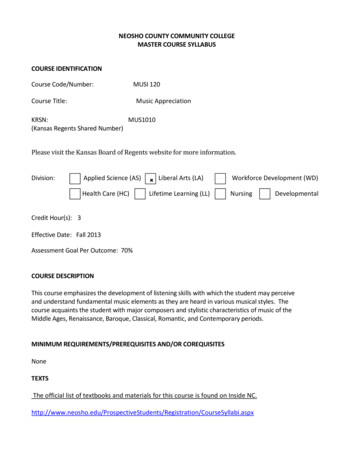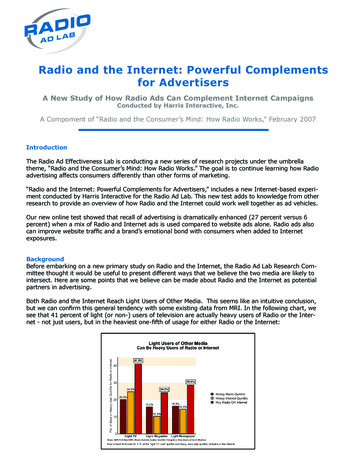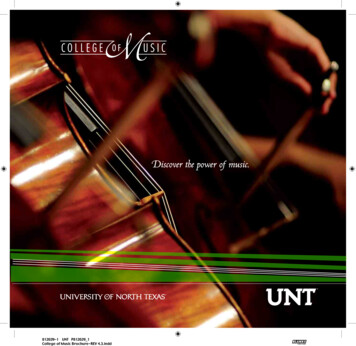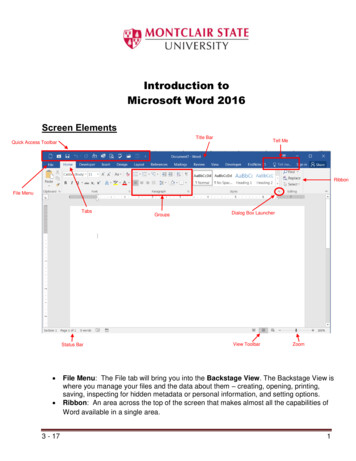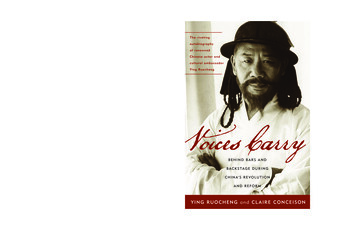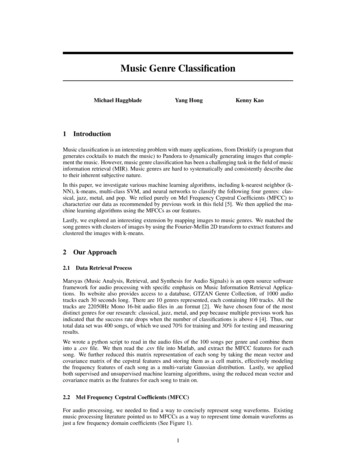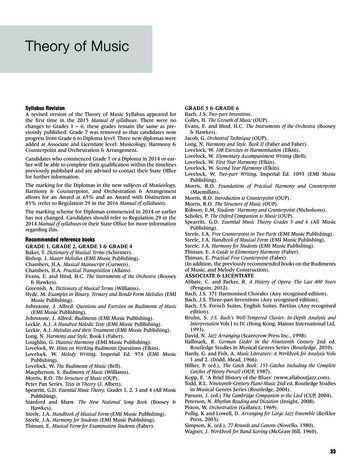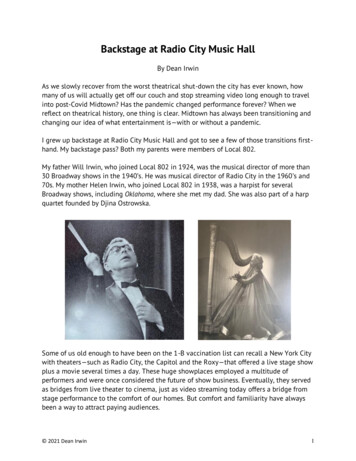
Transcription
Backstage at Radio City Music HallBy Dean IrwinAs we slowly recover from the worst theatrical shut-down the city has ever known, howmany of us will actually get off our couch and stop streaming video long enough to travelinto post-Covid Midtown? Has the pandemic changed performance forever? When wereflect on theatrical history, one thing is clear. Midtown has always been transitioning andchanging our idea of what entertainment is—with or without a pandemic.I grew up backstage at Radio City Music Hall and got to see a few of those transitions firsthand. My backstage pass? Both my parents were members of Local 802.My father Will Irwin, who joined Local 802 in 1924, was the musical director of more than30 Broadway shows in the 1940’s. He was musical director of Radio City in the 1960’s and70s. My mother Helen Irwin, who joined Local 802 in 1938, was a harpist for severalBroadway shows, including Oklahoma, where she met my dad. She was also part of a harpquartet founded by Djina Ostrowska.Some of us old enough to have been on the 1-B vaccination list can recall a New York Citywith theaters—such as Radio City, the Capitol and the Roxy—that offered a live stage showplus a movie several times a day. These huge showplaces employed a multitude ofperformers and were once considered the future of show business. Eventually, they servedas bridges from live theater to cinema, just as video streaming today offers a bridge fromstage performance to the comfort of our homes. But comfort and familiarity have alwaysbeen a way to attract paying audiences. 2021 Dean Irwin1
A hundred years ago, the idea of shelling out a nickelto sit in a dark, shabby room, watching a silent,black-and-white image flicker on a wall struck manypeople as suspicious, even unhealthy. Why were thelights so low? You could barely see the person sittingnext to you. Anything might happen.The early cinema experience in a nickelodeon was afar cry from the glory of live theater. So, giftedentrepreneurs in the 1910’s started renovating moviehouses to offer what theater patrons expected: comfyseats, luxurious decor, better lighting, and a pipeorgan to accompany silent films instead of a piano.This soon went beyond equipping live Vaudevilletheaters with movie projection; impresarios in majorcities started building theatrical palaces designed tofold the silent film experience into a spectacularstage event, with a small army of singers, dancersand musicians. Known as Presentation Houses, theydrew audiences by the thousands.Nobody was better at this than a German-Jewish immigrant named Samuel L. Rothafel,known as Roxy. He rose from showing silent films in the backroom of a hotel in ForestCity, Pennsylvania, to being the most sought-aftermovie presenter in New York City just six years later.Roxy had a showman’s gift for getting people to line upfor this new type of theatrical experience. Recalling hishumble childhood, part of Roxy’s mission was to offer atruck driver the same cultural experience as an operafan, “A college degree for the price of a movie ticket.”There were cut-down versions of classical pieces for theorchestra, patriotic songs, live pageants during holidays.Above all, it was good for business.Roxy’s financial backers were impressed and put him incharge of a series of New York City theaters, eachoutdoing its predecessor in grandeur. The Strand at 47thand Broadway was upstaged in 1916 by the Rialto at 2021 Dean Irwin2
42nd and Broadway. Then a year later, Roxy took over Broadway’s new Rivoli between 49thand 50th, followed by the big Capitol theater just north of Times Square in 1920. Each hadits own company of artists that delivered live stage presentations in between movieshowings, sometimes performing as the film was projected.It was during his management of the Capitol that Roxy began to use the brand-newmedium of commercial radio to broadcast his stage shows. Even more ingenious was hisidea to go backstage with a group of performers sitting around a microphone, letting hisradio audience eavesdrop behind the curtain. By 1923, millions of Americans who hadpurchased radio sets stayed home on Friday nights, listening to a live theatrical broadcastfrom the Capitol and hearing Roxy and his Gang talk about it. They were the streamingequivalent of their day.As Ross Melnick points out in his fine biography of Rothafel, American Showman, at a timewhen many producers worried that Radio would destroy live theater, Roxy figured out thatradio actually attracted thousands of new fans who would travel to New York City just tosee his famous theater.In 1927, a group of financiers built a movie palace even grander than the Capitol at thecorner of Seventh Avenue and 50th street with the latest in film projectors, an orchestra of110 musicians, a choir of 110 singers, three pipe organs, and an all-women precisiondance troupe imported from St. Louis called The Roxyettes. In fact, the theater itself wasnamed the Roxy, not simply to honor Rothafel’s success, but because Roxy had become astar who could draw big audiences. “It’s the Roxy and I’m Roxy,” he said when his theaterwas compared to the Roman Coliseum, “I’d rather be Roxy than John D. Rockefeller orHenry Ford.” It was the peak of his career.A generation later, when my mother and I emerged from the subway at that same corneron Seventh Avenue and 50th street in the summer of 1960, the Roxy theater had just been 2021 Dean Irwin3
torn down to make room for a drab office building, one of many turning Midtown into aseries of glass and steel boxes. Roxy himself had died of a weak heart in 1936 when hewas just 53. He’d had a warning four years earlier in the form of a heart attack on openingnight of the last grand theater built just for him—Radio City Music Hall.But Roxy had made the mistake of switching the successful formula of a movie and a showinto an endless stage spectacle that seemed to go on forever. The critics were not kind andby the time Roxy recovered his health, he had lost his influence at the Radio City MusicHall. Management quickly restored the stage show/movie format and, staffed by many ofthe talented people Roxy brought with him, it became a success.One talent Roxy brought to Radio City was Russell Markert, the choreographer who hadcreated the St. Louis Rockets who became the Roxyettes—but changed their name again tothe Rockettes now that they were installed in the new Rockefeller Center. He enlarged thetroupe to 36, enough dancers to fill the length of the Music Hall’s enormous stage, a blocklong. The tallest women were put in the center, to strengthen the illusion of a straightline, and each could kick higher than her head, in perfect unison.There was Erno Rapee, the orchestral conductor who partnered with Roxy to create customscores for the silent films that played in his theaters and on the radio. He took over as thefirst musical director of Radio City Music Hall. And Leon Leonidoff, the Romanian dancerwho started as Roxy’s assistant, became the Music Hall’s longtime senior producer, takinghis old boss’s pageants and spectacles and making them even bigger.Then, 28 years after opening night, Radio City added onemore talented theater professional as their new choraldirector, my father, which is why my mother and I were onour way to visit him that day in 1960.My dad, Will Irwin, had won a scholarship to Juilliard,trained in piano and classical composition but ended upfalling in love with Broadway. Befriended by Vernon Dukeand George Gershwin, my father dreamed of becoming asongwriter, and Gershwin couldn’t have been kinder to him.He would invite my dad to his penthouse apartment onRiverside Drive, where, after dinner, he, my father andOscar Levant would improvise together in an attic roomwith three pianos. Levant nicknamed my dad “Juilliard”,probably because my father seemed so sincere as a starryeyed twenty-year-old. Or maybe it was also because he was a good pianist, good enoughto support himself and his mother by playing at clubs and speakeasies around the city. 2021 Dean Irwin4
Gershwin knew my dad needed work, so he got hima job as the pianist in his new musical Let ‘em EatCake, the sequel to Of Thee I Sing, but the showwas a flop and my dad was soon out of work.So, Gershwin introduced him to Irving Berlin, whoneeded a musical secretary to put the songs hecreated on paper. Berlin could neither read norwrite musical notation. He was so afraid he wouldlose an idea before someone could write it downthat he’d call my father in the middle of the night,telling him to get over to his office right awaybefore he forgot the melody. It wasn’t the easiestjob in show business, but it was a start.Little by little, my dad became the pianist for manyBroadway musicals, gradually working his way up to becoming a musical director. By the1940’s he was conducting Rodgers and Hammerstein’s Oklahoma when he noticed anattractive harpist in the orchestra who became my mother a few years later. Harpists leantheir instrument back on their bellies to play, filling my gestation period with arpeggiosand glissandos. Fortunately for me, Broadway shows kept mostly to major keys.We traveled around the country in the early 1950’s during the twilight of the greatpassenger trains with the national tours of South Pacific and The King and I. The wholecompany rode together on the train: Yul Brynner as the King, Patricia Morrison as Mrs.Anna, a score of Hispanic kids as the king’s children, who passed for the Siamese royalfamily under the lights. There were key stage hands and the eight principal musicians inmy dad’s orchestra. We would pull into a new city on Sunday night, get to the hotel andnext morning my dad would pick up the rest of a brand-new orchestra for a performancethat night. Next Sunday we’d travel again. We did this for five years.Long before 1960, school prevented me from continuing life on the Road and my parentshad grown weary of traveling, so the job of Choral Director at Radio City offered my fatherthat rarest of things: a steady job in live theater.It was steady because in those years the Music Hall never closed. It was the biggestindoor theater in the world, seating an audience of over 6,000, alternating a new stageshow with a first-run movie premiere four times a day, seven days a week. For the weeksaround Christmas and Easter, there were five shows a day to accommodate the hugecrowds who waited in lines around the block. When the movie changed, the stage show 2021 Dean Irwin5
changed with it. Everyone at the theater hoped for a long movie run so they didn’t have torush into production for the next show.On that afternoon in 1960, my mom and I found the 51st street stage entrance and went upto the fifth floor where my dad had a small office with an upright piano and a desk. His jobas Choral Director was to hire and rehearse the singers needed for each production, whichvaried, depending on how many voices were required. Sometimes he put together a choirof 16 men to sing Max Bruch’s “Kol Nidrei” for the show that ran during the Jewish highholy days; sometimes he needed a group to sing carols and double as wise men for theChristmas show. Leon Leonidoff, who had never lost his Romanian accent, turned to mydad at the dress rehearsal of a Christmas Show and asked “Vill, vhere did you find suchstupid vise men?” He didn’t like the way my dad’s singers stumbled around the manger.There were live animals during the Christmas show: a baby elephant, a camel, a horse andseveral sheep who stayed on stage level in the Animal Room, making the theater smelllike the circus it actually was. Besides the Rockettes, there was a resident Corps de Ballet,vocal soloists, the 50-piece orchestra, and guest acts that were booked for every show:jugglers, acrobats, magicians, professional whistlers, stand-up comics, bull-whip artistswho could flick a cigarette from the lips of a glamorous assistant.Behind the scenes, a phalanx of carpenters, prop men, electricians and hydraulicsmechanics handled the sets, the fly floor, the lights, and the three massive elevators andturntable which made up the surface of the stage. 2021 Dean Irwin6
Interestingly, the elevator system was built by Otis Elevator in 1932 and used as thetechnology for U.S. aircraft carriers in World War II. During the war, there were governmentagents backstage to prevent espionage.Between the stage shows and movie presentations was a twelve-minute intermissionwhen audience members who’d already seen the show could leave, and new spectatorscould enter and take their seats. It was known as the Organ Break because when thehouselights came up, one of the Music Hall’s resident organists would pop out of an alcoveon either side of the stage and play the massive pipe organ, the largest ever built by theWurlitzer company.The organist’s sudden appearance seemed like magic because the audience, distractedby the end of the movie, hadn’t seen him slip unobtrusively behind the curtains housingthe organ console on the side ofthe stage.When the houselights came up,the organist would hit a switch,opening the alcove curtains andmoving the entire console outtowards the audience on amotorized track and into thespotlight. At the end of the break,he’d hit the switch and glide backinto the alcove. 2021 Dean Irwin7
Ray Bohr, the assistant chief organist, told me that one day when he flipped the switch andstarted playing, the console kept moving out, straining against four huge chains whichheld the organ to the back of the wall, threatening to topple over into the first rows of theaudience. Bucking back and forth on the organ, Ray yelled at the people in the front to getaway from him before they were crushed. Stagehands disabled the switch and saved theday. Ray finished the break, and the show went on.It was just one of many backstage stories, some funny, like the star of Bethlehem gettingstuck on its overhead track at Christmas, and some fatal, like a performer falling to hisdeath when part of the stage had been lowered sixty feet to load a set. It was a big placewith a lot of moving parts.As a kid, I was always fascinated by the pipe organ, whose parts were hidden all over theceiling of the auditorium—Radio City’s famous series of concentric rings, shaped like asunset. From my dad’s fifth floor office, I would wander down the hall to a big metal door,unlocked in those days, which led to shadowy catwalks inside the roof of the theater.There in the darkness I could glimpse the stage and the audience far below.During the organ breaks, xylophones and bells a few feet from me would burst into life asthe organist pulled the stops. The huge 32-foot bass pipes for the pedals made the wholebuilding shake.Since the theater never closed, there was a daily rhythm to the Music Hall, like a smallvillage, starting around 10 in the morning when the doors would open, and ushers wouldseat people for the first showing of the movie. 2021 Dean Irwin8
The first stage show happened around noon andwould run anywhere between 35 minutes to anhour, depending on the length of the film. Thesecond show began around 2:30pm, the “dinner”show around 6pm, and the last show would startbetween 8 and 9 in the evening.The fourth show was considered the mostimportant of the day, with ticket prices slightlyhigher and performers warmed up and on theirtoes. The musical director wore a tuxedo insteadof a dinner jacket for the fourth show and untilthe 1950’s, the chief stage manager also wore atux backstage, even though the audience couldn’tsee him.Thanks to his Broadway experience, my dad soonbecame one of the assistant conductors. His bosswas Raymond Paige, who’d made a name as apopular orchestra leader in the 1950’s. Redhaired and of Welsh extraction, Mr. Paige was ashowman on the podium. With a sense of humorand a taste for drink between shows, he told my dad that one of the 1930’s mother-ofpearl buttons on the conductor’s stand could blow up the orchestra pit. My dad never triedit, but he quickly became the musical liaison between Raymond Paige and the hottempered producer, Leon Leonidoff, on the opening day of a new show.Furious that tempos were wrong and corrections from dress rehearsal hadn’t beenfollowed, Leon would search for Paige in his office and backstage. “Vill,” he would ask mydad in his ungrammatical way, “Did you seen Paige? He is hiding from me. I know he ishiding.” My dad would plead ignorance, then, back in his office, he’d get a phone call witha quiet voice on the other end.“Will? Raymond Paige. Is your wife with you?” “No, Mr. Paige.” “And your young son he’snot visiting?” “Why no, Mr. Paige.” “Good. I’m in the second chair behind the blue mirror inthe Men’s lounge. Come get me and we’ll step across the street to Schrafft’s and have acup of cheer.” At the restaurant bar, my dad would go over the show notes. He wasbecoming part of the family, part of a self-contained entertainment complex.The Music Hall had its own cafeteria, its own hospital, its own daytime dormitories. Therewere vast rooms in the basement where sets for the next show were built, rehearsal halls 2021 Dean Irwin9
on the top floors where the orchestra, dancers and singers could work out their routines.Dress rehearsals took place at 5am, hours before the theater opened for the run of a newmovie and a new show. Stagehands had been up all night, taking down the old sceneryand putting up new sets. It was known as “working the change.” Many of the staff had beenwith each other not just for weeks or years but for decades, longer than the longestrunning Broadway show. Everyone referred to the theater simply as “The Hall.”By the time I entered high school, my dad had become Musical Director of Radio City and Icould travel to 50th street by myself on a Friday afternoon. I’d arrive before the third showand watch it out front with the audience. Sometimes I’d spot Mr. Valentino, a white-hairedgentleman who sat in the first row on the left almost every day, although he usuallyattended a first or second show. Some of the Rockettes would recognize him and give hima wink.My dad and I would have dinner together and I’d tell him how school was going. He’ddescribe his latest challenge, such as finding 18 performers who could sing and ice skateat the same time, replacing a Dutch troupe who had suddenly quit because Leonidoff hadpromised them a deluxe hotel and put them up in a fleabag instead. There was a teeterboard act, two men who juggled Indian clubs while balancing on a board and roller, who’dfallen down because one of the assistant conductors played their music too slowly. Theyhad ducked under the curtain as it fell, screaming “Assassino! Assassino!” (“assassin”).This unfortunate conductor also happened to be on the podium during a show thatrequired a band car move, where the big wooden platform that held the orchestra rolledon metal tracks from the front to the back of the stage. But one of the wheels rolled overthe power cable, stopping the orchestra in the middle of the stage.Frozen in the lights, the orchestra had to repeat the “Rakoczy March” four times before anew cable could be spliced, causing backstage wits to joke that it was the only time thisparticular conductor had ever been asked to play an encore. Nobody got hurt, which wasalways the main thing.After dinner, we’d return to my dad’s office, now a much larger space with a grand piano,where he’d change into his tux for the last show. Everybody knew me because I’d grown upin the place, so I got to watch from the wings backstage. I’d watch the Rockettes clickityclack in their tap shoes, forming up on either side of the stage to make their entrance.There might be an acrobat on a ladder who balanced a sword on the point of a dagger heldin his mouth, followed by my dad’s choir driving Chevrolet convertibles on stage to sing“New York, New York, it's a helluva town ” 2021 Dean Irwin10
Every stage presentation at the Music Hallwas a variety show, following the formulathat Roxy Rothafel had offered in the 1920’s.They started with something cultural for amiddle-class audience, like Strauss’s“Fledermaus” overture or Rimsky-Korsakov’s“Capriccio Espagnol.”At Christmas, the Rockettes would dance the“Wooden Soldiers” routine created by RussellMarkert. During Easter, every show wouldbegin with a cathedral set where Rockettesand Ballet dancers, dressed as nuns, wouldslowly carry bouquets of white lilies untilthey formed a gigantic cross, hit withspotlights as the music climaxed.And if the movie happened to be short, there was time for really big production numberslike the “Undersea Ballet,” first choreographed by Florence Rogge for the Roxy Theater.The entire stage was flooded with ultraviolet light and dancers dressed as sea creatureswould bob and weave in fluorescent costumes, flying through the air on wires.The Rockettes and Corps de Ballet would do a combined version of Ravel’s “Bolero,” mydad picking up the tempo slightly each time the melody repeated, to avoid running intothousands of dollars in overtime at the end of the week. Maurice Ravel might haveobjected, but the composer never had to perform his piece four times a day.Each show’s finale would have everyone on stage as the orchestra played the final notes,the folds of the motorized contour curtain would come down, the band car would descendfrom view into the basement and the deep notes of the organ would signal anotherintermission before the final showing of the movie that night.Singers and dancers walked off stage, wishing each other goodnight, the stage managerswould reset the elevators and turntable to their original positions, stagehands would raiseand lower sets for the first show the following day and the block-long movie screen wouldslowly descend behind the curtain, ready for the film to begin.Almost all the films were first run premieres, using their run at the theater as promotion:“Now playing everywhere after eight sold-out weeks at Radio City Music Hall.” 2021 Dean Irwin11
In the 1960’s I remember severaliconic releases such as Breakfastat Tiffany’s, The Music Man andMary Poppins. In the 1930’s ithad been The Scarlet Pimperneland The Adventures of RobinHood. And every stage show alsohad a title, like Enchanted Islandsproduced by Leon Leonidoff orAutumn Album produced byRussell Markert.In 1976, after the close of myfirst career as a high schoolEnglish teacher and thebeginning of a second career inbroadcast television, I became a summer relief stage manager to make some money andgive the three regular stage managers time to take their vacations. Suddenly the ropes andthe curtains illuminated in half-light of backstage were filled with deep responsibility. Inlive theater, you can’t go back to fix a mistake, and from the edge of the contour curtain, Icould see the rows of patrons, staring up at the movie screen, who expected a perfectshow to follow. I couldn’t disappoint them, or my dad, who might be conducting that dayrather than one of his assistants.Assistant stage managers had to be backstage half an hour before each show to make sureeverything was in place and to make announcements on the internal PA system, wherethey could be heard on every floor and every dressing room. “Twenty minutes to theshow,” I would say, as crisply as I could. This was followed by “Ten minutes to the show”then “Eight minutes to Organ,” indicating the start of the organ break, which was whenpeople started taking their places and the stage level became crowded.Finally, I’d announce: “Five minutes to the show, musicians in the pit please.” The chiefstage manager would relieve me at the Prompt side, stage right, near the main controlpanel and one of the electricians and I would go down to the basement where theorchestra musicians were climbing up sets of wooden stairs to take their places on theband car. The electrician, often a guy nicknamed Bumpy, nephew of the Music Hall’sformidable chief electrician, would place his hand on the emergency cut-off switch onthe wall.If you weren’t on the band car when the show began, you wouldn’t get paid. Once a crazedmusician had leapt onto the band car as the first elevator was rising and was almost cut in 2021 Dean Irwin12
half as it reached the inside wall. Bumpy and I were there to make sure that didn’t happenagain, so when the conductor gave me the signal, I’d call upstairs for the elevator to raisethe orchestra to just below audience level.I’d return backstage and, as the overture began, I would hold a rubber-coated button witha long wire connected to the arc lights, above the third balcony, way in the back of thetheater. In those days, there were no electric spotlights powerful enough to reach theMusic Hall’s stage from that distance, so they still operated with a 1930’s carbon-arc, acurved piece of solid carbon which burned with anintensity which would blind you if you didn’t viewit through a thick piece of green glass built intothe side of the spotlight. The lights were hot asa furnace, and the operators would have toslowly advance the carbon as it burned away.Dean Irwin and his father WillI’d wait for the moment in the overture whichcalled for a lighting change, push the buttonwhich signaled the arc light guys to switch theirgels, turning the contour curtain from blue to red,orange to green, or whatever the show called for.The button made a loud buzz, audible not only tothe arc lights but in much of the theater, but noone seemed to notice. I was on pins and needlesnever to miss those lighting cues hidden in themusic. There are still pieces, like Gershwin’s“Concerto in F”, which I cannot listen to withoutreaching for that button.Much of a stage manager’s time is spent anxiously waiting for the next cue, often standingnext to a performer about to step out in front of the audience, and the Music Hall held areally big audience. I recall standing on the “O.P.” (Opposite Prompt) side, stage left,waiting to give my cue to the stagehands while next to me a stunning woman fromEastern Europe in a sequined costume would also be waiting for her entrance. Since thishappened four times a day, I could not help trying a little conversation.“Hello Olga. How are you?” Olga’s eyes were fixed on her fantastically muscled husband,already doing flips on stage, as she replied. “Fine.” “It must be difficult to do what you do.”“Yes. Difficult.” And so on. Weeks later, when Olga warmed to me slightly, she told me thatonce she had missed her grip on the trapeze, taking a long fall to a circus floor, breakingevery bone in her back, including her heels. A month later, she was back on the trapeze,making up for lost time. “My gosh, Olga, that must have been terrible ” but she had 2021 Dean Irwin13
already stepped on stage, her sequins flashing in the arc lights, joining her husband on thehigh wire. I gave my cue and wondered how long it would take to learn the trapeze.The stagehands usually had a big poker game between the second and third shows,winning and losing sums that dwarfed my earnings as a stage manager. They werewonderful guys who told salty stories but who would risk their lives in a second if anemergency happened on stage. And it sometimes did.The backstage twilight seemed frozen in time,but I could see that things were changing. AlanCole, a talented vocal soloist my dad often hired,no longer gave his live announcement at the startof every Christmas pageant: “And there wereshepherds abiding in the field, keeping watchover their flock by night ” Alan was gone, and hisvoice now played back on tape.Jack Ward, an assistant organist who always worea white dinner jacket and smoked with a longcigarette holder before he slipped out to theconsole, suddenly passed away. George Cort, afellow stage manager who’d attended his funeral,told me that Jack had appeared in his casketwearing an identical white dinner jacket, as ifhe’d just gotten back from playing a break.Looking down at him, George automaticallychecked his watch, to make sure he wouldn’t belate for the show.Radio City was still drawing big crowds at holiday times, but fewer feature films werebeing made that could play to a family audience and the Music Hall was no longer the onlyplace in New York for big cinema premieres. There was more pressure to save money. TheCorps de Ballet was disbanded, and guest dancers were hired only if a show needed them;the number of musicians in the orchestra was allowed to diminish drastically, which upsetmy father, and even the number of Rockettes were cut.Russell Markert, creator of the Rockettes, whom I’d always admired for his waxedmoustache, pin-striped suit and the goodwill that flowed around him in the theater,decided to retire. The Rockettes stole his dancing shoes and had them bronzed as afarewell gift. 2021 Dean Irwin14
Leon Leonidoff remained, older and grayer, issuing commands in his thick, Romanianaccent and still able to create spectacular stage effects using the equipment built intothe theater like the Steam Curtain, which could envelop the Cathedral set for the Eastershow in a mist that looked like incense. Or the Rain Curtain, which sparkled under thelights but presented a hazard for dancers who had to step through the puddles. But bythe late 1970’s, the last of New York’s Presentation Houses was losing money and runningout of time.When Leon Leonidoff retired after 42 years, empty seats were the norm for the first andsecond shows. To the horror of the dedicated performers still working to make good stageshows, it became clear that the Rockefeller Organization, the company that owned andoperated Rockefeller Center, wanted the big theater to fail so they could tear it down andbuild an office building or a hotel, something that would make them more money. Moneywas more important to them than preserving the most famous theater in America and, in1978, the Music Hall very nearly met the same fate as the Roxy Theater had in 1960.A ballet captain named Rosemary Novellino-Mearns courageously began a
My father Will Irwin, who joined Local 802 in 1924, was the musical director of more than 30 Broadway shows in the 1940's. He was musical director of Radio City in the 1960's and 70s. My mother Helen Irwin, who joined Local 802 in 1938, was a harpist for several Broadway shows, including Oklahoma, where she met my dad. She was also part of .

